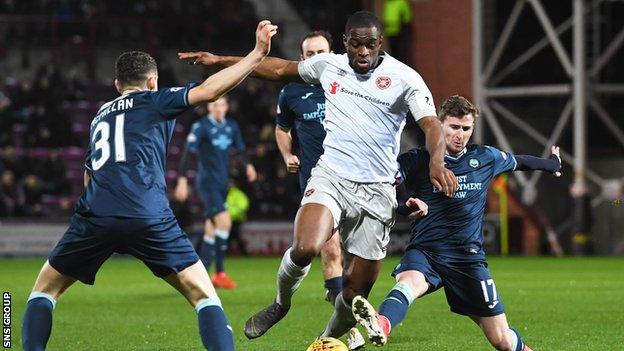What next in Hearts & Partick Thistle's case against relegation?
- Published

Hearts and Partick Thistle's case will now be heard by an arbitration panel
After a Court of Session hearing lasting three days, it was decided Hearts and Partick Thistle's legal challenge to their relegations will be heard by an arbitration panel.
The pair want reinstated in the Premiership and Championship respectively, and are disputing the validity of the SPFL vote which curtailed the season and consigned them to demotion.
So what happens now?
Advocate Paul Reid joined BBC Scotland's Sportsound programme to explain - and here are the key questions answered.
What is arbitration?
The first point is whether the decision for the case to be heard by an arbitration panel makes a material difference to proceedings.
"It's like thinking of it as a private court," Reid said. "It's not a mediation where the parties come together with someone trying to facilitate a settlement. It's just another way of deciding the dispute.
"The difference between arbitration and a court is like playing behind closed doors. The arbitration will not be open to public. We'll know the result at the end but we won't get to watch the argument.
"It's exactly the same legal principles. This is not uncommon in commercial disputes."
Who is deciding the case?
Each party nominates an individual from the Scottish FA's Tribunal Candidate List, and jointly agree to appoint someone who has been a judge, solicitor or advocate for at least 10 years to act as chairman. This could happen as early as Monday.
But despite the parties nominating two of the panel members, they are not representing them.
"They're independent," Reid explains. "The clubs arrange the match officials but you still expect the match officials to behave as they normally would. These are still independent members and very experienced lawyers."
Despite being convened under Scottish FA rules, the association has nothing to do with determining the dispute.
So overturning relegation is still possible?
"All the arguments that Hearts and Partick Thistle wanted to present to the court will be presented to this panel and they can get the same remedies," Reid explained.
Crucially, that means they can still be reinstated in the Premiership and Championship respectively, and failing that they could be awarded the £10m compensation they seek.
In short, the court hearing was to decide the appropriate forum for the dispute. As Reid put it: "It's akin to arguing over which neutral venue you're going to have a match. Either the court or before the arbitration tribunal."
What about the documents; are they important?
At the Court of Session hearing, Lord Clark ruled in favour of Hearts and Partick Thistle's motion to release certain documents relating to the case.
Reid explained that these will help inform the two clubs' strategy, including whether they want to hear directly from SPFL chief executive Neil Doncaster and Dundee managing director John Nelms as witnesses on the circumstances around the vote to end the season.
Dundee's belatedly decisive vote is one of the contentious areas.
"I'd imagine that's why the legal teams for Hearts and Partick Thistle want to see the documents, so they can decide: 'Do we need to hear from these people, or do the documents speak for themselves?' If it's all emails and WhatsApp messages then you don't always need to hear from the individual.
"From what we know in the public domain about the Dundee vote, that it was received prior to the deadline and it was critical, you can understand why a court or a tribunal would say, 'well, there's a case to answer'. You can understand why questions are being asked."
Reid added: "Which way it goes will really depend on what's in those documents and what was going on in the run-up to those votes being cast and that decision being taken."
Will we get a decision before the season starts?
With the Premiership scheduled to start on 1 August, and the fixtures to be released on Monday morning, the need for a quick resolution is clear. So will we get it?
Reid says that once the chairman is nominated, the rules require the arbitration panel to convene as soon as practicable.
"You can see this moving quite quickly," he added." "The court had time available to hear this [case] the week after next and allowing some time for a decision, you would have been maybe two-and-a-half weeks [for a resolution] had the court decided it.
"I'd imagine the arbitration panel would want to do something similar. They'll be aware of the importance of getting a decision as soon as they can."
Crucially for clubs hoping to start the season on time there is no appeal for an arbitration decision, barring exceptional circumstances. So whatever the outcome, it will be binding.